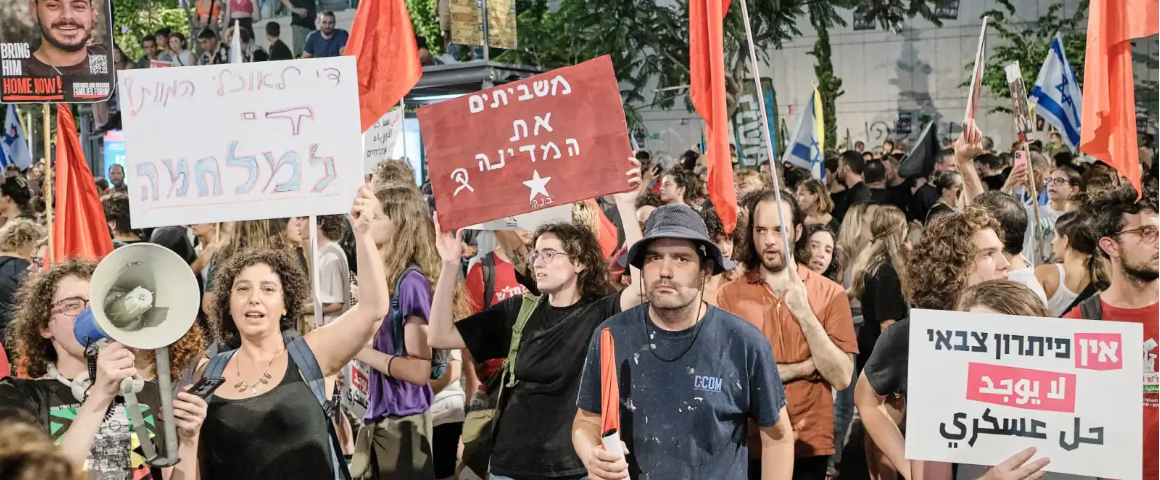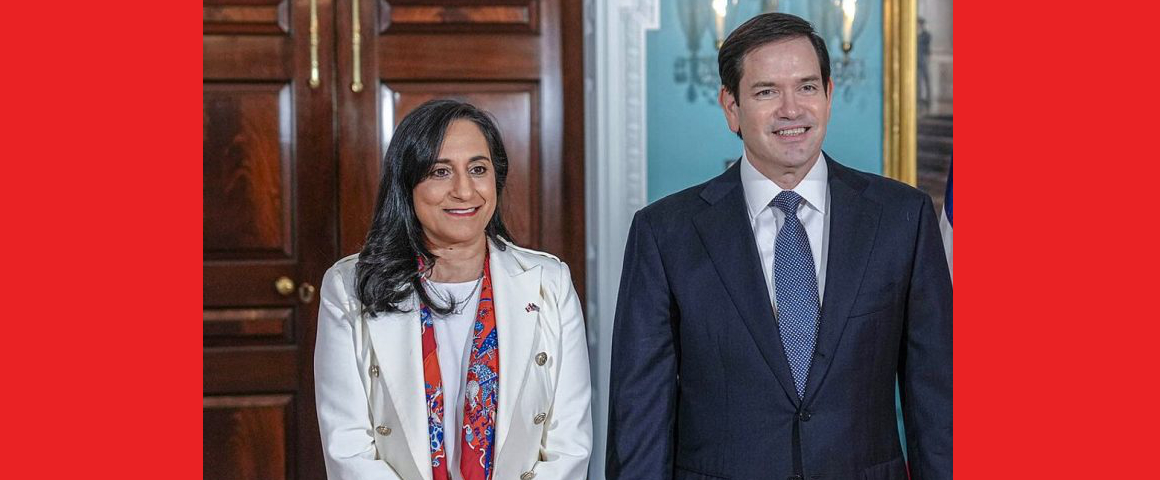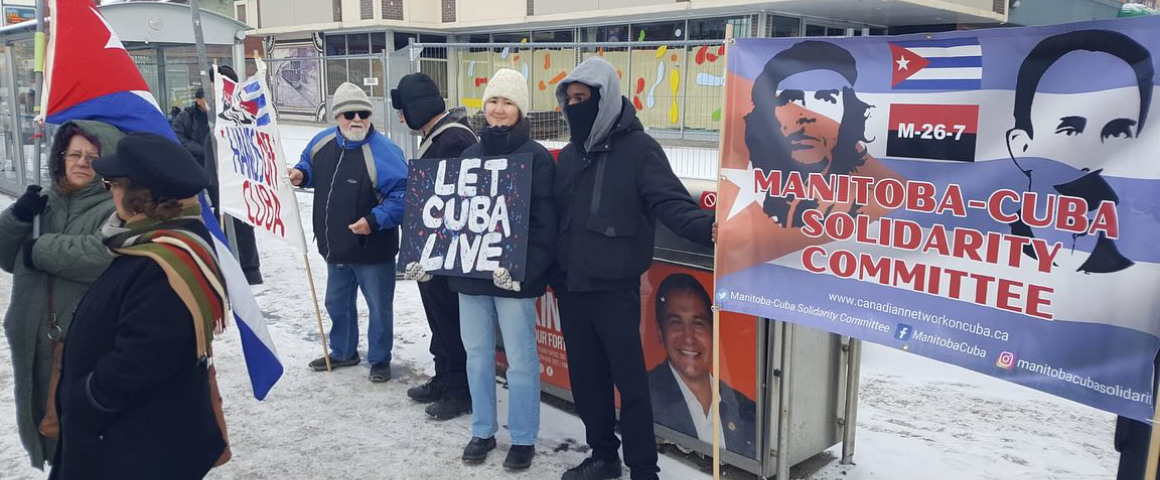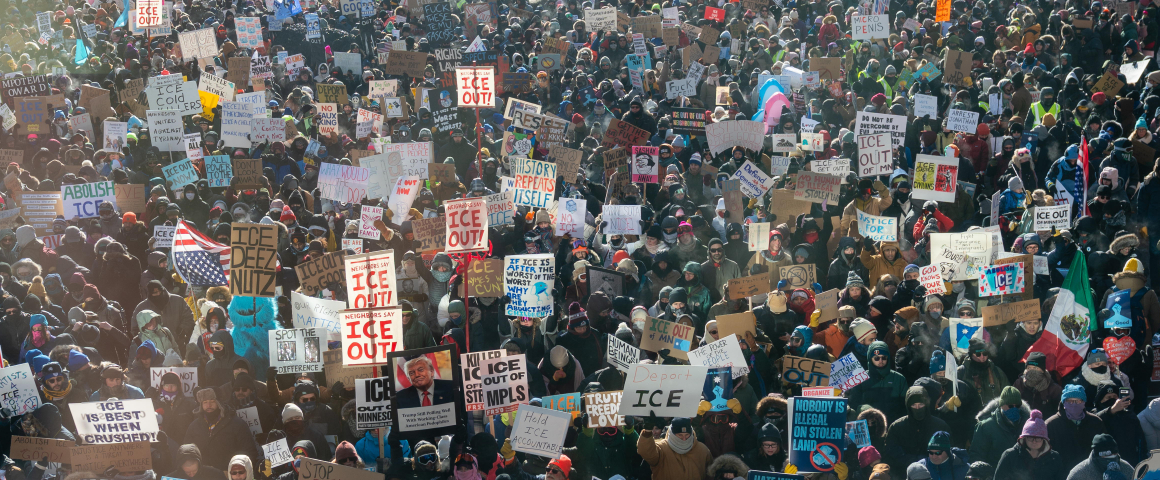By C.J. Atkins
September 2 might not have been a Labour Day holiday in Israel, but it was certainly still labour’s day. Millions of workers there walked off the job as part of a pro-peace general strike that brought the country to a standstill.
Called by Arnon Bar-David, chairman of Histradut – the General Federation of Labour, Israel’s main trade union alliance – the strike was aimed at protesting Prime Minister Benjamin Netanyahu’s refusal to conclude a ceasefire in his war on Gaza and his government’s failure to secure the release of hostages still held by Hamas.
According to reports from Zo Haderekh, the Israeli Communist Party’s Hebrew-language newspaper, the strike paralyzed the country’s main airport and shut down schools, ports, airlines, banks, the electric company, the post office, many government departments, bus companies, several municipal services, trains and universities.
The strike came on the heels of mass protests on September 1 which saw as many as 500,000 Israelis pour into the streets of every major city and town to express grief and anger after six hostages were found dead in Gaza.
Information released by the Israeli National Forensic Institute reported its examination of the bodies showed the six had been shot at close range 48 to 72 hours before their discovery. At least three of them were supposedly scheduled for release as part of the first phase of a ceasefire deal currently being negotiated.
Talks on the deal continue to hit a dead-end because of Netanyahu’s insistence that Israel occupy and have full control over Gaza’s land adjoining the Egyptian border – the so-called “Philadelphi corridor.”
Polls show that majorities in Israel – including among the families of hostages – believe Netanyahu holds final responsibility for the fact that there are still captives who have not been rescued or recovered since the October 7 Hamas attacks.
The Israeli government’s war has turned Gaza to ruins since October and killed at least 40,819 Palestinians and wounded 94,291. Both these numbers are believed to be major undercounts, though, due to the large number of people still missing beneath the rubble or whose remains have been destroyed by the Israeli military.
In conjunction with representatives of hostage families, strike and protest leaders argued this weekend that the Netanyahu government could have already concluded a hostages-for-ceasefire deal months ago and that the continued bombardment of Gaza places the captives in danger while also brutally slaughtering ever-rising numbers of Palestinians and jeopardizing any chance for long-term peace.
“Instead of a deal, we get body bags,” Histradut leader Bar-David declared. “We hope that our intervention might shock those who need to be shocked. I call on the people of Israel to go to the street and sound the cry of the hostages and their families.”
Histradut pre-dates the State of Israel and has long been a mainstay of the “Labour Zionist” movement. For many decades, membership was restricted to Jewish workers, and the union federation functioned as arms-length extension of the state. This stark break from the government, therefore, represents a major shift in the political situation in Israel.
The multi-ethnic character of the actions on September 1 and 2 were also notable. The country’s Arab working class joined in the mobilization, with the non-partisan National Committee of the Heads of Arab Localities (NCALC) issuing a statement declaring its backing for the strike. The organization emphasized “its principled position against the war” and called “for its immediate halt.”
There have been several waves of protest demanding a ceasefire over the last several months, but the mobilization of labour’s forces in a general strike represents a jump in the strategic orientation of the peace movement in Israel.
A general strike is one of the highest forms of class struggle, but elevating the tactic to a political strike directly challenges the power of the ruling class at the state level, marking a qualitative advance. The importance of this development was clear to all, including the Netanyahu government. After previously facing a general strike from Histradut over his judicial overhaul scheme in 2023, Netanyahu was eager to short-circuit this move by workers.
The prime minister petitioned a labour court to stop the strike. Judges gave the government what it wanted, ordering organizers to halt the strike by 2:30 pm local time on September 2, saying it was a “politically motivated” work stoppage rather than a labour dispute and was therefore illegal.
Finance Minister Bezalel Smotrich – who is also Israel’s colonial governor in the Occupied West Bank, overseeing the expansion of illegal settlements there – threatened public sector workers with the withholding of their wages and possible firing if they participated in the strike. Likud-dominated trade unions and municipalities also ordered their workers not to take part.
Seeking to drive an ideological wedge between the various forces participating in the labour and peace uprising, Netanyahu said the strike “serves Israel’s enemies” and “obstructed negotiations” to release hostages.
The Arab-language Marxist newspaper Al-Ittihad hailed the demonstrations of the last few days, saying they represent the “transformation of the protest movement into a huge popular bloc…capable of breaking its marginalization,” a movement “possessing the tools to influence government decisions that reach the threshold of civil disobedience and disrupt the state.”
The unity demonstrated over the weekend, Al-Ittihad said, can achieve the goals of forcing the government to end the war on Gaza, secure the release of hostages, and terminate the occupation of Palestinian territories only if it goes beyond being a one-time demonstration.
The ceasefire movement, the paper argued, must start by “expanding to include support even from the right-wing audience that currently supports Netanyahu and the ruling Likud party.” It said focusing on the broad demand of hostages-for-ceasefire may be the way to do that. The “feelings of despair among the movement of the families of the detainees,” the editors wrote, have the potential to become “a force of influence” that could bring down the government.
People’s World (edited for length)
[Photo: Zo Haderekh]
Support working-class media!
If you found this article useful, please consider donating to People’s Voice or purchasing a subscription so that you get every issue of Canada’s leading socialist publication delivered to your door or inbox!
For over 100 years, we have been 100% reader-supported, with no corporate or government funding.




